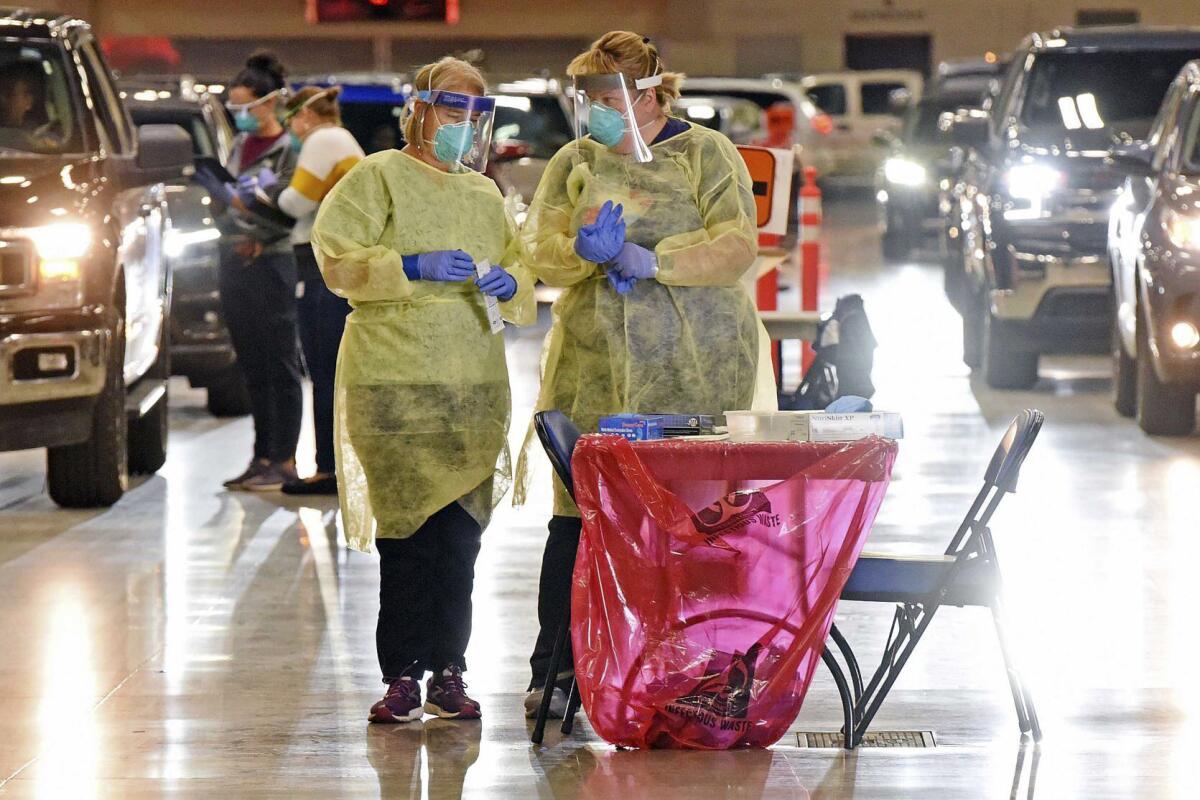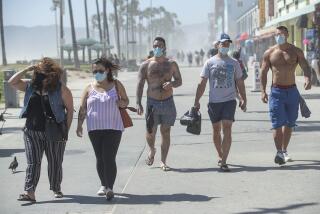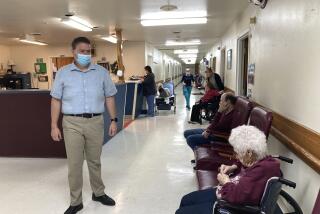A dozen U.S. states remain without mask mandates to protect against COVID-19. Why?

As coronavirus cases have surged, a public safety measure encouraged by doctors and scientists worldwide to help reduce the chance of infection has remained stubbornly at issue for some Americans: wearing face masks.
In fact, as of Friday, 12 U.S. states had not issued mandates requiring the wearing of masks and were seeing high levels of infection, according to the Centers for Disease Control and Prevention.
Meanwhile, the number of coronavirus-related deaths in the U.S. rapidly approached 300,000 people, based on data from the Coronavirus Resource Center at Johns Hopkins University.
Many of those opposed to wearing masks say that COVID-19 risks are being exaggerated or that mask mandates violate rights, are not enforceable or create polarization. President Trump has mocked the use of masks, though he has worn them at times.
In some communities, protests have been held by those who oppose mask mandates.
In one recent case, anti-mask protesters gathered outside Idaho’s public health department and board members’ homes during a virtual meeting to vote on a local mask ordinance. A visibly shaken Diana Lachiondo, an Ada County commissioner, left the meeting early because she said she was worried about her 12-year-old son, who was home by himself. Board members voted to adjourn the meeting to a later date.
A study by researchers at the Institute for Health Metrics and Evaluation, published Oct. 23, showed that masks could save more than half a million lives through the end of February if Americans wore them every time they left their homes.
U.S. health officials in recent days have emphasized that distribution of COVID-19 vaccines will take months and that safety measures remain vital. President-elect Joe Biden this week called for everyone to wear masks during the first 100 days of his presidency, which begins Jan. 20.
“We need your help. Wear a mask for just 100 days,” Biden said in a Twitter video. “It’s the easiest thing you can do to reduce COVID cases, hospitalizations and death.”
Here is some of the latest information on mask requirements in the U.S.
Which states do not have mask mandates, and what are some of their reasons?
Alaska, Arizona, Florida, Georgia, Idaho, Mississippi, Missouri, Nebraska, Oklahoma, South Carolina, South Dakota and Tennessee do not have mask mandates.
Some governors have encouraged people to voluntarily wear masks but declined to enact legal mandates despite calls for such action from some residents, local politicians and health and medical organizations. Some governors have said local governments would be better able to enforce rules.
“I don’t think mask mandates are appropriate,” Nebraska Gov. Pete Ricketts, a Republican, told reporters during a Nov. 17 news conference. He has, however, asked Nebraskans to wear masks when visiting the grocery store or in crowded or enclosed settings.
Many of Nebraska’s largest cities adopted some type of mask mandate, usually providing exceptions for children and those who have a disability or medical condition that prevents them from wearing one. However, some areas, such as Douglas County, cannot legally enforce such rules unless granted approval by the state. County commissioners recently called on the governor to reconsider his stance on mask mandates.
“It’s common sense. Simply wearing a mask makes you safer and respects the airspace of people you see,” Douglas County Commissioner and former Omaha Mayor Mike Boyle said in an interview. “The governor is really following the Trump line. It’s really too bad.”
In South Dakota, Gov. Kristi Noem, a Republican, has opposed mask mandates and refused to shut businesses or close churches.
“Since the start of the pandemic, Governor Noem has provided her people with up-to-date science, facts, and data and then trusted them to make the best decisions for themselves, their families, and — in turn — their communities,” said Ian Fury, the governor’s communications director, in an emailed statement. “And when it comes to mask mandates, the data is clear. Cases are rising dramatically even in states that have implemented mask mandates.”
South Dakota Sen. Red Dawn Foster and Rep. Peri Pourier, both Democrats, recently sent the governor a letter calling on her to look past party lines and issue a mask requirement.
“This isn’t a political game of playing roulette with our communities or our families. It is an issue of public health that surpasses political parties and hits the core of our humanity,” they wrote in a letter dated Nov. 19.
The South Dakota State Medical Assn., comprising physicians, residents and medical students, last week urged the governor to take a more aggressive approach to help stop the spread of the coronavirus. The group cited a report from the White House Coronavirus Task Force recommending that the state ensure masks are worn at all times in public and reduce capacity in public and private indoor spaces.
“We urge the public to follow these precautions to prevent infections and slow hospitalizations to avoid overwhelming our health systems and to avoid a situation where there are not enough hospital beds, physicians, nurses and other healthcare professionals,” Dr. Benjamin C. Aaker, SDSMA president, said in a statement. “A vaccine is almost here, but for now, following these recommendations is critical.”
Do states without mask mandates show greater rates of infection than the national average?
Yes. All 12 states have infection rates higher than the national average of 4,730 cases per 100,000 people, according to the CDC.
South Dakota has the most of the 12, with 10,057 cases per 100,000 people.
Here are the infection rates for the 11 other states without mask mandates:
- Nebraska: 7,556 cases per 100,000 people
- Idaho: 6,728
- Tennessee: 6,248
- Mississippi: 5,869
- Oklahoma: 5,793
- Missouri: 5,463
- Arizona: 5,404
- Alaska: 5,148
- Florida: 5,054
- Georgia: 4,995
- South Carolina: 4,754
Are states with mask mandates doing substantially better?
Of the 38 states with mask mandates, 18 have rates higher than the national average.
According to a study published in October in the CDC’s Morbidity and Mortality Weekly Report, researchers found that “a combination of voluntary and enforceable measures is more effective than any single measure.”
“Mitigation measures mandated through public policy can effectively increase social distancing, and wearing masks has prevented transmission of SARS-CoV-2,” the study said.
North Dakota has 11,474 cases per 100,000 people, the most of all 50 states. Gov. Doug Burgum resisted implementing a mandate for months until November, when he said doctors and nurses needed help as the number of cases continued to grow. “Our situation has changed, and we must change with it,” he said in a press release.
Vermont decided to carry out its mask order in August, citing an increase in coronavirus infections.
“Rather than waiting like other states have, I feel we need to act now to protect our gains, which have allowed us to reopen much of our economy,” Gov. Phil Scott said in a news release. The Green Mountain State has 864 cases per 100,000 people, the least in the country.
Dr. Anthony Fauci, the nation’s top infectious disease expert, told CNN in October that a nationwide mandate may be tricky to enforce but essential to help slow the rate of infections.
“They sound very simple, but we’re not uniformly doing that, and that’s one of the reasons we’re seeing these surges,” he said.
What does Biden mean when he says he’ll work with governors and mayors to implement a mask mandate? What if they refuse to cooperate?
Biden said on Twitter that he’ll aim to sign an executive order to require masks everywhere. Wearing a mask, he said, is not a political statement but a patriotic act.
“It will start with my signing an order on Day One to require masks where I can under the law, like federal buildings, interstate travel, on planes, trains and buses,” he said. “I’ll be working with governors and mayors to do the same in their states and their cities. We’re going to require masks wherever possible, but this goes beyond government action. And so, as a new president, I’m going to speak directly to the American people and say: We need your help.”
More to Read
Sign up for Essential California
The most important California stories and recommendations in your inbox every morning.
You may occasionally receive promotional content from the Los Angeles Times.











